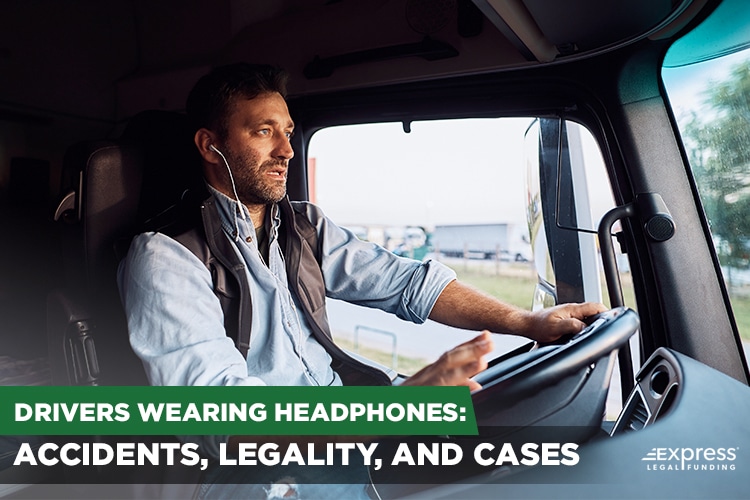
Communication and entertainment are two of modern society’s most highly valued resources, though one is objectively more important than the other.
Nevertheless, our desire to maintain communication with others and our need to be entertained is an inescapable facet of the human experience.
The problem is talking on the phone, listening to music, and watching videos has become a portable activity. Even thirty-five years ago, that was not the case.
Talking on a phone, listening to music, watching videos, etc., were all activities performed in the comfort and privacy of our homes.
That’s not the case today. It’s not that we don’t sit and relax at home at times. But we now have the option of multitasking or doing these things when we’re out in the world we were not able to do before.
Fortunately, the creation of headphones has generated an alternative that allows us to listen to music and talk on the phone without being as disruptive as we would otherwise.
One of the most popular reasons why people wear headphones while driving is so we can listen to our preferred music during long and tedious commutes.
This has made long drives in isolation more bearable to those who rely on socialization or entertainment to survive the boredom.
Unfortunately, operating a motor vehicle with music or a podcast in your ear can impair your ability to drive safely, depending on the volume of your entertainment and the traffic.
It is not unheard of for motor vehicle collisions and serious injuries to occur because one of the drivers was distracted by whatever was coming out of their headphones.
The questions are: what is the legality of using headphones while driving, and are there any laws that regulate it?
Let’s get started!
Can You Legally Drive With Headphones?
Yes, although it depends on where you are driving. Most states (32 states, counting Washington D.C.) are hands-off regarding headphones regulations.
These states allow drivers to wear headphones and have no laws against wearing headphones (including earphones, earbuds, headsets, earpieces, AirPods, etc.) while driving a motor vehicle.
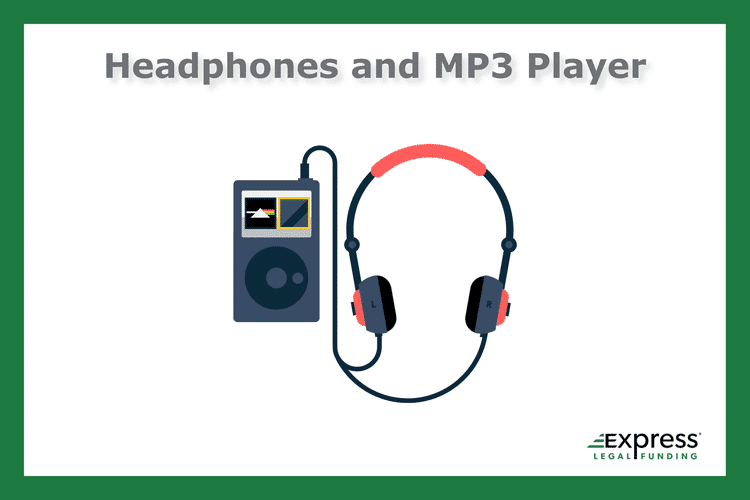
Ultimately, this means it is not a crime and legal to drive your car while wearing headphones or AirPods in the majority of the states in the U.S.A.
Headphones Impact Spatial Awareness While Driving
Still, like with other driving laws, just because it is not illegal, it does not mean it is safe or advisable to drive with headphones.
Statistics and studies show that wearing headphones while driving is distracting and impacts your spatial awareness, making it harder to hear and sense other cars and hazards on the roadway, increasing the odds of getting in a car accident.
This is all the more true in areas with heavy traffic that require intense focus to avoid negligently driving into a hazard.
Distracted driving is dangerous driving, and this is why federal and state laws focus on lessening this risk by requiring us to take measures to drive safely on the road.
Traffic Laws and Driving Regulation
On an individual level, the following laws are all-encompassing. You may be surprised to learn which are regulated by the states and which are federal. Each focuses on enforcing specific areas of motor vehicle safety:
- Speed limits (state level) – The federal government does not set or enforce speed limits, which is a common misconception.
- Registration and car inspections (regulated on the state level)
- Laws against driving while intoxicated and underage drinking are federally required nationwide to avoid preventable injuries, damages, and loss of life
- Surprisingly, texting and driving are only illegal in 48 states (including Washington D.C.) Missouri allows texting and driving for anyone 22 or older, and Montana has no ban whatsoever.
The Legality of Texting and Driving
One of the more surprising things about driving laws is that the state law enforces the rules about texting and driving, and 2 American states lack laws about texting and driving.
The lack of driving laws in Missouri and Montana to ban texting and driving provides a good demonstration for us to consider how just because something is legally allowed does not mean it is safe.
The reason is that it is now understood as a fact that glancing at your phone while driving presents a significant risk since your eyes are off the road (Distracted Driving).
Similarly, this concept applies to the states that have not passed legislation about the legality of wearing and using headphones while operating a motor vehicle.
That is in contrast to what most people, logically, yet are mistaken to think, which is wearing headphones while driving is universally illegal in the United States of America as it can impair your ability to hear oncoming vehicles or emergency vehicle sirens (such as those from police cars and ambulances).

The reality is that very few states have laws prohibiting or otherwise reducing our ability to drive with headphones.
Florida: Wearing Headphones While Driving Law
However, there may be a shift happening as Florida’s state legislature just passed a law that makes it illegal to drive with headphones and earbuds while driving.
The first part of the new law making headphones (and AirPods) illegal to wear while driving reads as follows:
No person shall operate a vehicle while wearing a headset, headphone, or other listening device, other than a hearing aid or instrument for the improvement of defective human hearing.
Interestingly, the Florida state law refers to headphones in the singular headphone.
So to answer the question: Can I wear AirPods While driving in Florida?
No, it is illegal to wear AirPods while driving in Florida.
Although, the law states that a hearing aid or instrument used to improve defective hearing is allowed, which could apply to AirPods as they can be used as an assisted listening device when paired with an iPhone or smartphone.
What States is it Illegal to wear headphones while driving?
At the time of writing, only nine states have entirely outlawed headphones while driving which include:
- Alaska
- California
- Florida
- Illinois
- Louisiana
- Maryland
- Minnesota
- Rhode Island
- Virginia
- Washington
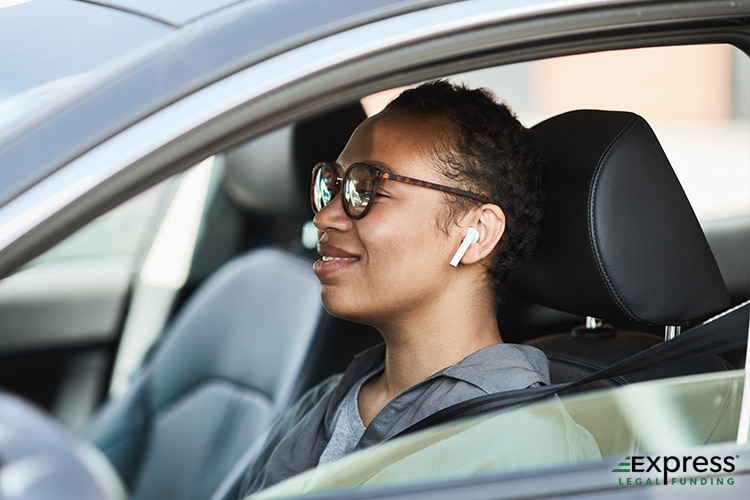
From a stricter but not a complete ban perspective, a total of seven states outlaw the use of headphones with notable exceptions:
Single-Ear Phone Calls:
In Colorado, Georgia, and Pennsylvania, drivers can keep their earphones or earbuds in one ear (i.e., one Apple AirPod in either the left or right ear).
This permission is exclusively for drivers answering phone calls while driving, and all other uses of headphones are prohibited. This includes hands-free Bluetooth headsets that are designed to sit on one ear.
Single-Ear General:
In New York and Ohio, drivers can keep their headphones in one ear or an earpiece while driving. This permission is available for all possible uses of the headphones rather than just for phone calls.
One-Ear Voice-to-Text:
In Massachusetts, under the state’s hands-free law, drivers are legally allowed to keep an earbud (or AirPod) in one ear only for voice-to-text and communication.
However, Massachusetts drivers are not allowed to do so when their cell phone device is properly mounted.
The law does not specify whether single-ear headphone use applies to people using GPS navigation devices.

These permissions do not apply to drivers under 18 years old, as it is illegal for anyone under 18 to use a phone or electronic device while driving, even in hands-free mode.
Arizona School Bus Drivers Wearing Headphones:
Lastly, Arizona is the one odd state out on the list of whether or not it is illegal to wear headphones while driving a motor vehicle. From a legislative standpoint, no laws have been passed to ban or partially ban the use of earphones while driving in Arizona.
However, there is an administrative code made by Arizona’s Department of Public Safety that makes it a code violation for school bus drivers to wear audio headsets, earphones, or earplugs while driving. It reads as follows:
Except as provided in subsection (D)(27), a school bus driver shall not use audio headsets, earphones, earplugs, Bluetooth devices, cellular phones, personal digital assistants, or other interactive wireless devices, whether or not hands-free, when the school bus is in operation.
This rule of Arizona is designed to ensure that children can communicate with the adult driving the vehicle in case of emergency, as it is crucial for school bus drivers to be able to hear in case a child yells for help.

Due to it being an administrative code and not a legal statute, it is not considered a crime by itself if a bus driver wears headsets while driving children.
No Laws About Wearing Headphones Use While Driving in 32 States
The remaining 32 states(including Washington D.C.) have no laws about driving with headphones; citizens can use them while operating vehicles as they see fit.
They might lose the privilege to drive if they consistently cause accidents or violate distracted driving laws. Still, currently, most motorists can operate their vehicles normally with headphones while not breaking the law.
Unfortunately, being allowed to do something does not necessarily mean they can do so responsibly. Regardless of what you are listening to, you are still operating a 4,000-pound bullet on wheels.
Therefore, due to the already significant risks of driving, it gets even riskier when you drive a car or truck while wearing headphones, causing your auditory senses to become temporarily impaired.
While the odds of dying in a car crash are low, the fact that nearly 6% of fatal accidents are caused by the at-fault driver being distracted is a significant issue that warrants attention.
These scenarios are especially important for the victims of the crash rather than the perpetrator.
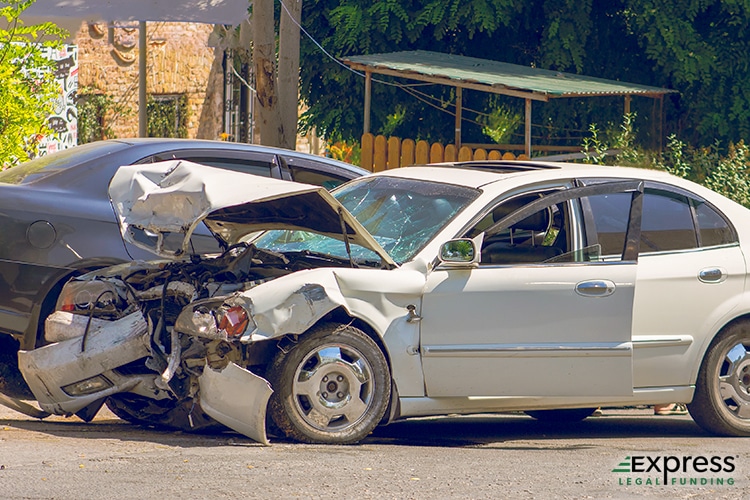
Motor Vehicle Collisions While Wearing Headphones
While the World Health Organization (WHO) recommends that headphone users keep the volume at 75 decibels or less, many people enjoy cranking up the volume for a more visceral experience.
While this might allow you to listen to your music in your preferred way, there is an underlying issue with higher volumes.
Disregarding that listening to headphones with too high of a volume for an extended can damage your ears, leading to permanent hearing loss and tinnitus, doing so while driving cuts off the essential sense of hearing.
We need to have uncompromised audio input to drive safely.
While there are many legally deaf people who can safely operate a motor vehicle to the best of their ability, they have been trained to hone their other senses to compensate.
Not to mention that people who are hard of hearing appreciate how being able to hear makes it easier to drive safely.
The average person listening to their headphones is both cut off from the auditory world around them and distracted by whatever is playing.
Whether it be music, radio, or an audiobook, they are all noise, and noise is distracting regardless of the volume.
Naturally, people can get overly enthused with the words of a podcast or taken by the melody or lyrics of music and often begin to sing and nod along.
While not inherently dangerous, combining these activities with driving means the driver could become distracted and lose control of the vehicle.
We are not suggesting that everyone who uses headphones while driving risks causing an accident.
Rather the odds are increased since you will be distracted to some degree, with your focus divided between the sound emitting from your headphones and the road.
Conversely, some people have an easier time focusing on the road while listening to music in the background.
However, this detail carries little weight from a legal perspective if you are breaking the law by wearing headphones while driving or protecting yourself from possible lawsuits. So the legal concept is as follows:
Suppose someone loses control of their vehicle because they were distracted by the media playing from their headphones.
In that case, they (and their insurance company) are liable for their dangerous driving and the subsequent damage they cause.
Example Driver Wearing Headphones Car Accident:
For example, a man is wearing earbuds while driving along in the left lane of an interstate highway and is two exits away from when he needs to merge right to get off the highway. From all accounts, he is going the speed limit and keeping his eyes on the road.
However, he is listening to his favorite politically charged podcast to pass the time.
Naturally, this means his focus is divided between paying attention to the road and what is being discussed.
Then, halfway through the episode, the host drops a bombshell story on a topic important to the driver, which leads him to become overly focused on the podcast and not enough on driving to forget about paying attention to the road.
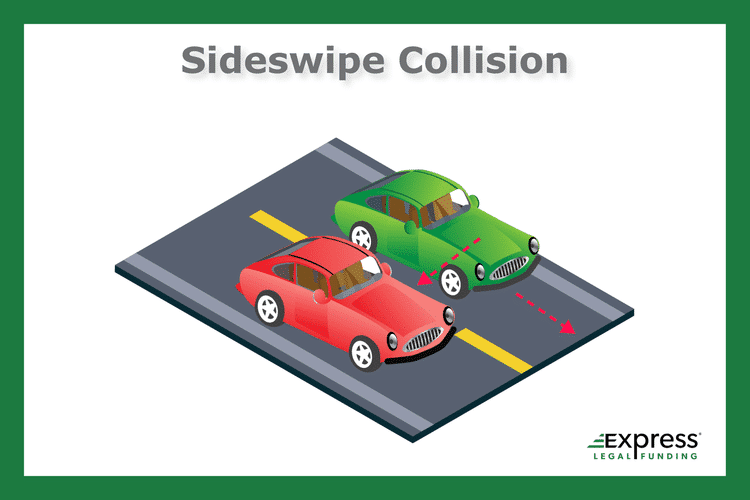
The next thing that happens is that he doesn’t see the sign that his exit is coming up until it is almost too late. So as not to miss the exit, he attempts to quickly veer his way over by crossing the center lane.
However, in the process, he forgets to click the signal arrow to warn other drivers of an impending lane change and causes an accident by sideswiping the car next to him.
Because he had to rush and forgo critical safety tasks like signaling and checking his side view mirror before merging into another lane, he caused a car accident collision.
Although sideswiping car collisions like those in the above example are not the most common accident type, they are far from a rarity. Not to mention, they can be devastating for the victims when they happen.
All motor vehicle collisions are extremely dangerous and can cause serious injuries, especially when one vehicle is smaller than the other.
Research Studies About Music Causing Risky Driving
Recently, several studies have linked an increase in risky driving behaviors to how loud and fast music is playing.
One study found a pattern that people who listen to fast-paced music have faster reaction times but also make less accurate and less conservative decisions, which does not facilitate safe driving practices.
Novice Drivers Listening to Music While Driving
Another research study performed in Israel focused on novice drivers and listening to their preferred music while driving.
The study found a clear correlation between drivers listening to music they enjoy and the likelihood of engaging in risky and aggressive driving behaviors, which in turn also increases the chance of car accidents.
Faster Music Causes Faster Driving
Along the same line, a research study showed how our heart rates mimic the beats per minute (BPM) of the songs we listen to, including when we are driving.
So the higher the BMP of a song is, the higher the heart rate of the listeners as well as the increased chance of going over the speed limit.

Dr. Simon Moore of London University analyzed the findings and said,
Music that is noisy, upbeat, and increases your heart rate is a deadly mix. Fast beats can cause excitement and arousal that can lead people to concentrate more on the music than on the road.
Headphones offer an extra layer of isolation from the world around you, making it easier for those issues to affect you and make you less aware of the conditions of the road.
Higher Chance of Car Accidents
As a result, drivers listening to headphones while driving are at a higher risk of car crashes than other drivers.
The increased risk of a collision for drivers with headphones has reinforced the notion that distracted driving is inherently unsafe and feeds the misconception that it is universally outlawed.
However, as mentioned previously, the legislation in 32 states does not appear to be influenced by this legislation because most still put the choice of whether to wear headphones while driving in the hands of the motorist and not the government.
Distracted Driving Accident Statistics
Unfortunately, distracted drivers account for 8% of fatal and 14% of all injury car crashes, according to the most recent NHTSA study on distracted driving.
While the odds of dying in a car crash are low, 8% of accidents with fatalities are caused by the at-fault driver being distracted, which is a significant issue that warrants attention.
These scenarios can be crucial for the crash victims to determine if they are the case rather than the perpetrator.
What to Do If You Are Struck By a Distracted Driver?
Getting into a car crash because a driver was distracted can be infuriating, but worst of all, devastating. While surviving a car accident is extremely common, the damage it causes can radically affect you and your quality of life.
Car crashes result in mental and emotional trauma, significant medical expenses, and, almost always, property damage to your vehicle.

These damages inflicted upon you in the wreck can be devastating depending on your circumstances, and dealing with them because of someone else’s distracted driving and negligence is not easy, especially as they can cost you a lot of time and money to recover from.
Car Accident While Driving With Headphones
Fortunately, the American legal system has a civil lawsuit measure that helps people in distracted driver car accidents.
Regardless of whether the driver was breaking the state’s laws by wearing headphones during the collision, there are no guarantees you will recover money from the distracted driver who caused the wreck. A personal injury case is never a slam dunk.
Hire a personal injury lawyer.
That is why you should seek to hire a car accident attorney by scheduling a free consultation with them to see if they are a good fit to represent you on your distracted driver case according to your state’s civil laws.
Still, it should be noted that filing a lawsuit does not automatically mean you will succeed in recovering money from the accident.
Prove Fault to Get Settlement
To get a settlement, you must prove that the other driver was at fault for the auto accident before you can expect any compensation.
Proving that someone else hit you with their car is relatively easy, especially if the damage to your car is useful evidence, which is often the case with rear-end car accidents.
You and your car accident lawyer must prove that the accident occurred because the at-fault driver had headphones on that distracted them.
This can be more difficult to prove since it is not always possible to see inside the other car before the driver exits.
Fortunately, few drivers think to remove their headphones following a sudden collision and will likely still have them on when they leave their vehicle to inspect it.
If they are not still wearing the headphones when they exit their vehicle, the headphones will almost certainly be visible in their vehicle upon further inspection.
Considering how it is essential and legally required (in most states) to contact the authorities, whenever there has been a motor vehicle collision, there is a good chance that a police officer will discover the headphones themselves once they get to the scene.
If you are in a state where such behavior is illegal, the driver may face criminal charges, which can bolster your case.
Your personal injury attorney can argue that the accident could have been avoided had the distracted driver kept their headphones off.
Still, you must prove they were wearing and actively using the headphones at the time of collision for this argument to work.
Fortunately, to successfully recover a settlement, you do not necessarily have to prove why they were negligent so much as you have to prove they are liable for causing the negligent driving accident.
Closing Statements: Wearing Headphones and Distracted Driving
Regarding accidents with distracted driving and wearing headphones hiring a lawyer will almost always come in one way or another.
Even though wearing headphones while driving is not illegal in the 32 states, accident victims can sue the person who drove distracted and caused the accident.
From the defendant’s point of view, If you get caught using headphones/earbuds in any of the 18 where it is illegal or restricted, you might need to hire a defense attorney or criminal law firm to represent you, as you may be facing face charges.

People who are victims of a car crash because a driver has headphones on are put into a situation of genuine financial concern as they must deal with unexpected costs and medical bills.
That is why being able to sue the party responsible for the accident is so crucial.
The reality is the more you have to prove and the worse your injuries, the longer the car accident lawsuit will take. All of which means you have to wait longer to get your settlement.
Just because you are exercising your legal options by bringing the lawsuit does not mean you are financially stable in the meantime.
In reality, it is extra understandable if you are not because of the very nature of why you need to bring a car accident lawsuit.
Legal Funding for Distracted Driving Car Accidents
We at Express Legal Funding understand this financial reality and why we can help you before, during, and after you file a civil lawsuit where you seek money for your loss.
As a pre-settlement funding company, we advance non-recourse funds to plaintiffs during their ongoing legal claims.
It’s non-recourse, which in the case of lawsuit funding means risk-free, as it’s not a loan of any type but a purchase agreement between a buyer and a seller.
That means we, as the legal funding company, can advance pre-settlement money to you in exchange for a portion of your potential case proceeds (settlement or trial award monies) so you can access the money you need now to pay your bills and make new purchases.
It’s risk-free because if you go to court and lose your case, translating to you recovering nothing from your claim, we don’t get paid, and the money you already received from us is yours to keep.
So with pre-settlement funding, you can get money from your claim, win or lose. Call us or apply online anytime for lawsuit funding if you need financial help during your lawsuit. Learn more about your legal funding options. We are here to help!
(Missouri consumer disclaimer: The type of pre-settlement financing we can provide to injured and damaged claimants in Missouri are recourse settlement loans.
Therefore, they are not risk-free advances contingent upon a potential case proceeds.
Lawsuit loans in states like Missouri are recourse loans and must, technically, by law, be repaid. Express Legal Funding-Missouri, LLC is a loan company licensed to give these loans in MO.)
